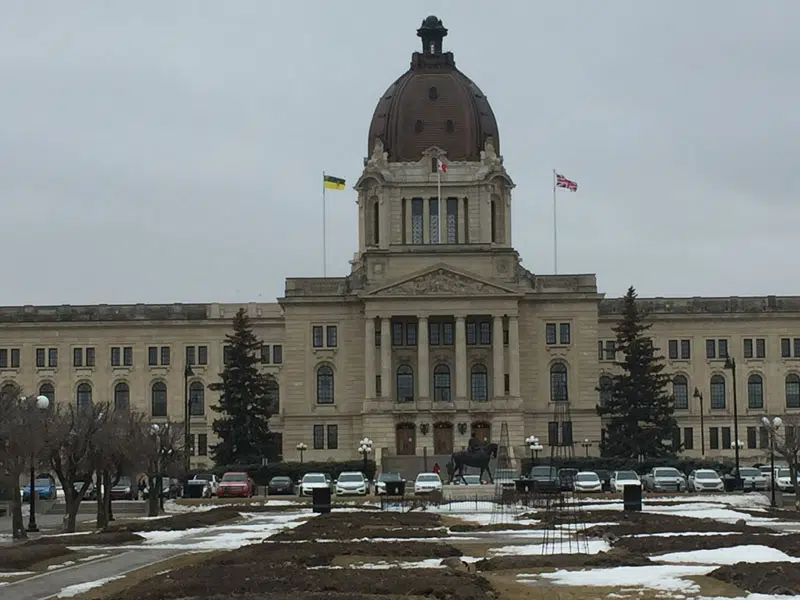
Cities and towns are looking for a larger share of municipal revenue sharing from the provincial government.
In its reaction to Wednesday’s provincial budget, the Saskatchewan Urban Municipalities Association (SUMA) notes more than 80 per cent of the population lives under its jurisdiction.
SUMA President Randy Goulden says the revenue sharing model needs to recognize the population shift and enable cities and towns to maintain infrastructure and services residents expect.
SUMA is disappointed the PST remains on municipal construction projects and that there wasn’t more money for supportive housing.
A resolution calling on SUMA to advocate for the province to immediately increase Saskatchewan Income Support program rates to meet basic living costs will be introduced at the organization’s annual convention on April 17 in Saskatoon.
The Saskatchewan School Boards Association says the budget increase for schools falls short of covering the costs due to inflation and enrolment growth. President of the SSBA, Jaimie Smith-Windsor, says the operating increase doesn’t cover the expenses that school divisions are facing, so it will instead contribute to the existing instability and continuing erosion of the publicly funded education system. Saskatchewan’s 27 school divisions are receiving just over $2 billion in operating funding, which is a 2.5 per cent increase. The budget also provides $7 million to retain the more than 200 Educational Assistants that have been hired since September of 2021.
The Saskatchewan Teachers’ Federation says the 2.5 percent increase in operational funding falls far short of keeping pace with rising costs. The STF says a minimum of five percent was required to prevent further cuts to services and supports that children need. STF President Samantha Becotte says the “government either doesn’t understand the issues or doesn’t think they are important.” She adds years of underfunding have created a learning environment where students’ needs cannot be meet because class sizes are too large. The STF is planning a Rally for Public Education at the Saskatchewan Legislative building next Wednesday, March 29th.
The CEO of the Greater Saskatoon Chamber of Commerce says there are plusses and minuses in the budget. Jason Aebig states that it focused tightly on investments in healthcare, which is critical, but job creators are going to have to wait until next year to see measures targeted to small and medium-sized businesses to help them access capital, cut costs and grow. In the meantime, Aebig says, “they will face high operating costs and taxes in an increasingly competitive environment where all businesses in our region are vying for people and capital to grow.”
On the other side, the Chamber applauds the significant paydown of the province’s debt, and a balanced budget with no deficit for the next fiscal year. He is also on board with the record-breaking Municipal Revenue-Sharing Program, which he suggests will mean good news for Saskatoon ratepayers. The City of Saskatoon’s share is nearly $57 million to offset potential increases to the mill rate and utility rates heading into the next two-year budget cycle. The Chamber will continue to push for tax relief, incentives and targeted initiatives for small and medium-sized businesses.
The North Saskatoon Business Association supports what it calls in a news release a “feel-good” budget. Executive Director Keith Moen noted that the government announced a $1 billion surplus budget despite the fact that expenses are up over $1 billion as well. He believes the budget is a good indicator that the provincial economy is on its way to recovery following some pretty tough years during the pandemic. Moen is particularly pleased with paying down the provincial debt by $1 billion. That’s separate from the $1 billion which was announced earlier this year. The one area the NSBA wishes wouldn’t have been in the budget is the intention to increase the Small Business Tax rate from its current zero per cent to one per cent effective June 1st. Moen says, “Although we’re seeing benefits of a growing economy, one of the areas that may still be needing stimulus is in the small business sector, but this is an area that we can continue to raise with the government moving forward.”
The Saskatchewan Media Production Industry Association is giving a thumb’s up to the budget, thanking the government and the Ministry of Parks, Culture and Sport for the additional $2 million announced in the budget, which is a 20 per cent increase, bringing total base funding for Film and TV Production to $12 million. SMPIA’s President, Mike MacNaughton says the financial support through Creative Saskatchewan last year helped to significantly increase production, providing work opportunities for local creatives and crews, while highlighting Saskatchewan’s people in their work. Creative Saskatchewan‘s CEO says it has been a big year for the province’s film industry and with an extra $2 million, added to the $10 million announced last year, Erin Dean expects this will mean more growth for the industry. Dean estimates the trickle down effect will be $55.8 million in economic impact and over 250 new jobs at a time when the demand for content has never been higher.
Prior to the budget being presented at the Legislature today (Wed), the Saskatchewan Federation of Labour called for a real raise for Saskatchewan workers, because of the cost-of-living crisis. President of the SFL, Lori Johb, says that didn’t happen, despite billions of extra dollars coming in due to high oil prices. She suggests he could also have rolled back the utility rate hikes and increased the minimum wage, and also urges for investing more into safe workplaces and eliminating workplace violence, more action to fix the healthcare crisis, and nixing all forms of privatization and sell-offs.
The Saskatchewan Mining Association says the increase to the Targeted Mineral Exploration Incentive Program and to the Mineral Exploration Tax Credit are vey welcome.
The province has committed $4 million to to expand incentive program to include exploration drilling for all hard-rock minerals and the Tax Credit will increase from 10 to 30 per cent. SMA President Pam Schwann believes the budget delivers in supporting Saskatchewan’s reputation as a world-leading jurisdiction for attracting mineral exploration investments. She notes that exploration investment in Saskatchewan averages over $230 million a year, with a significant amount staying in Saskatchewan and in particular in northern Saskatchewan, thanks to the supply chain which includes drilling companies, camp logistics providers, air, road and plane support and geophysical surveys.
The Canadian Taxpayers Federation calls the provincial budget a “wasted opportunity”. The CTF is happy to see a balanced budget, but believes more should have been done to reduce Saskatchewan’s debt, which will reach $18.1 billion by the end of next year. The Prairie Director of the Taxpayers Federation Gage Haubrich says interest payments on that debt will be $812-million annual—or $674 for every Saskatchewan resident. Haubrich adds other provinces have been providing tax relief to their residents, but Saskatchewan families were left out in the cold.
The Canadian Federation of Independent Business was hoping the provincial budget would contain tax breaks for its members. Topping the list was the small business tax rate, which will return to its pre-pandemic level of two percent in July 2024. CFIB provincial affairs director Brianna Solberg lobbied the province to hold the rate at zero at least until the end of 2024 to give more small businesses the chance to recover. Solberg says only half of small businesses are back to normal pre-COVID sales levels.
The Canadian Union of Public Employees Union says the budget is nowhere close to what is needed to fix the crisis in the public service. CUPE President Judy Henley says there have been many years of cuts, underfunding and privatization. With funding for education nowhere near the rate of inflation, Henley says universities will face more cuts. CUPE is also critical the budget did not contain any real relief from the rising cost of living and there was also no mention of providing an additional boost to the minimum wage. It will not reach the $15 an hour mark until October 2024.
The Saskatchewan Association of Rural Municipalities says there are positives in the provincial budget—but it would like to see additional investment for roads, bridges and rural broadband internet. SARM President Ray Orb says the new money for rural health care recruitment is badly need and increased funding for provincial farm support programs is welcome news. Orb is also encouraged by new and continued funding for rural crime reduction initiatives. SARM still wants to meet with all stakeholders to ensure there is no duplication of law enforcement efforts.






















